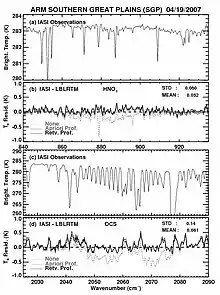
Brightness temperature observations and residuals (IASI- LBLRTM) for the ARM SGP case for the HNO3 (a, b) and the OCS (c, d) spectral regions
Within atmospheric science, LBLRTM - The Line-By-Line Radiative Transfer Model is an accurate, efficient and highly flexible model for calculating spectral transmittance and radiance.
See also
References
- Clough, S. A., M. W. Shephard, E. J. Mlawer, J. S. Delamere, M. J. Iacono, K. Cady-Pereira, S. Boukabara, and P. D. Brown, Atmospheric radiative transfer modeling: a summary of the AER codes, Short Communication, J. Quant. Spectrosc. Radiat. Transfer, 91, 233-244, 2005.
- Clough, S.A. and M.J. Iacono, Line-by-line calculations of atmospheric fluxes and cooling rates II: Application to carbon dioxide, ozone, methane, nitrous oxide, and the halocarbons. J. Geophys. Res., 100, 16,519-16,535, 1995.
- Clough, S.A., M.J. Iacono, and J.-L. Moncet, Line-by-line calculation of atmospheric fluxes and cooling rates: Application to water vapor. J. Geophys. Res., 97, 15761-15785, 1992.
External links
This article is issued from Wikipedia. The text is licensed under Creative Commons - Attribution - Sharealike. Additional terms may apply for the media files.